Mexico profile - Timeline
- Published
A chronology of key events:
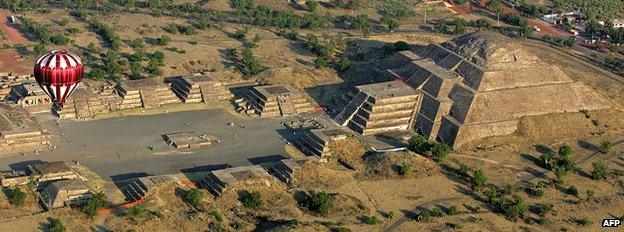
The city of Teotihuacan was a major pre-Colombian cultural centre
c. AD 250-900 Classical Maya city states flourish in the far south of modern-day Mexico, as well as in neighbouring Guatemala and Belize, before suffering a mysterious collapse.
c. AD 0-500 - Major cultural and religious centre of Teotihuacán flourishes. Thought to have been one of the world's largest cities at the time, but little is known about its ethnic and political nature.
6th-7th century - Influx of new peoples into central Mexico from the north, including speakers of Nahuatl.
800-1000 - High point of the Toltec culture, centred on the city of Tula, in modern-day Hidalgo province.
10th-16th centuries - Revitalised Maya civilisation blossoms in the northern Yucatan peninsula, creating major cities such as Chichen Itza and Uxmal.
1428-1521 - The latest of a long line of indigenous civilisations, the Aztec Empire - an alliance of Nahuatl-speaking city states led by Tenochtitlan - establishes hegemony over much of central Mexico.
Spanish conquest
1519 - Small Spanish army led by Hernan Cortes lands at Veracruz, marking the start of Spain's conquest of Mexico.
1521 - Allied with local anti-Aztec forces, Cortes' men capture the capital Tenochtitlan (modern-day Mexico City).
1521-1820 - Mexico forms part of the Viceroyalty of New Spain.
Independence
1810-21 - War of Independence ends with the creation of the short-living Mexican Empire, which includes Central America to the southern border of modern-day Costa Rica, as well as what is now the southwestern US.
1824 - Mexico becomes a federal republic. Central American provinces secede, becoming Guatemala, Honduras, El Salvador, Nicaragua and Costa Rica.
The new Mexican state is marked by tension between the conservative Spanish-origin landowning elite and the largely indigenous landless minority, resulting in instability and frequent armed conflict.
1836 - Former province of Texas, by now increasingly populated by English-speaking Americans, secedes after a war, going on to join the United States nine years later.
1846-8 - Mexican-American War ends with Mexico being forced to sell its northern provinces (including modern-day California, Nevada, New Mexico, Arizona and Utah) to the US.
1855-72 - "La Reforma" period, characterised by liberal reforms limiting the power and landholdings of the Catholic Church.
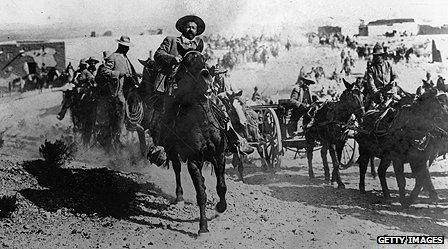
Pancho Villa was one of the leaders of the Mexican Revolution. His exploits have been recreated in a variety of books and movies
1864-7 - Archduke Maximilian of Austria is installed as emperor by France and conservative landowners, but is toppled and executed by Republican rebels.
1876-1911 - Porfirio Diaz's 35-year-long dictatorship brings stability, modernisation and economic growth, but at the price of political repression.
Revolution
1910-1920 - Mexican Revolution ends the Porfirio Diaz dictatorship and establishes constitutional government.
1913-14 - The liberal Francisco Madero introduces land reform and labour legislation before being assassinated. Victoriano Huerta seizes power. Political unrest continues with Emiliano Zapata leading a peasant revolt in the south.
1916-17 - Inconclusive US incursion against guerrilla leader Francisco "Pancho" Villa.
1920 - President Venustiano Carranza is murdered, followed by a decade of instability.
Institutional Revolutionary Party rule
1929 - Former president Plutarco Elias Calles forms what later becomes the Institutional Revolutionary Party(PRI), which dominates government for 71 years.
1934 - President Lazaro Cardenas begins programme of oil nationalisation, land reform and industrial expansion.
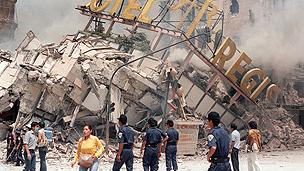
Up to 30,000 people were killed in the quake which struck Mexico City in 1985
1960s - Unrest amongst peasants and labourers over unequal wealth distribution is suppressed.
1968 - Student demonstration in Mexico City during the Olympic Games is fired on by security forces. Hundreds of protesters are killed or wounded. The extent of the violence shocks the country.
Oil discovery
1976 - Huge offshore oil reserves discovered; the Cantarell field becomes the mainstay of Mexico's oil production.
1985 - Earthquake in Mexico City kills thousands and makes many more homeless.
1993 - Parliament ratifies the North American Free Trade Agreement (Nafta) with the US and Canada.
Chiapas rebellion
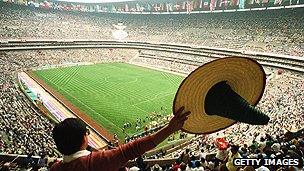
Mexico hosted the football World Cup in 1986
1994 - A guerrilla rebellion in Chiapas by the Zapatista National Liberation Army is brutally suppressed by government troops. The government and Zapatistas agree on greater autonomy for the indigenous Mayans of Chiapas the following year.
1996 - The insurgency in the south escalates as the leftist Popular Revolutionary Army (EPR) attacks government troops.
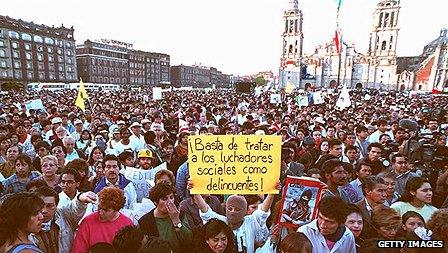
Mexico City in 1995: Thousands gathered in in support of Zapatistas pressing for indigenous rights
1997 - The PRI suffers heavy losses in elections and loses its overall majority in the lower house of parliament for the first time since 1929.
Fox election victory
2000 July - Vicente Fox of the conservative Alliance for Change wins presidential elections, the first opposition candidate ever to do so. Parliamentary elections see the Alliance emerge as the strongest party, narrowly beating the PRI
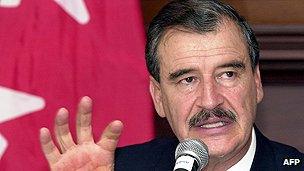
Vincente Fox broke the ruling party's 71-year dominance with his election victory in 2000
2002 June - Millions of secret security files are released, shedding light on the repression of hundreds of political activists in the 1960s and 1970s.
2006 July - Conservative candidate Felipe Calderon is declared the winner of presidential elections with a razor-thin majority over his leftist rival, Andres Manuel Lopez Obrador.
War on drugs
2006 December - A new federal police force is created to tackle drugs cartels; thousands of troops are deployed in the western state of Michoacan as part of a major anti-drug trafficking drive.
2007 October - Heavy rains flood nearly the entire southern state of Tabasco. Some 500,000 are made homeless in one of the country's worst natural disasters.
2009 March - Army troops enter Ciudad Juarez, on the border with the US, as open warfare erupts between rival drug gangs.
2012 July - The Institutional Revolutionary Party (PRI) candidate Enrique Pena Nieto wins presidential election.
2013 July - Miguel Angel Trevino Morales, head of the brutal Zetas drugs cartel, is arrested in the highest-profile arrest since President Pena Nieto adopted a policy of targeting local bosses rather than big names.
2014 August - Mexico's Congress approves sweeping reforms to the country's energy sector that will open the market to foreign oil firms and strip state-owned energy group Pemex of the monopoly it has held since nationalisation in 1938.
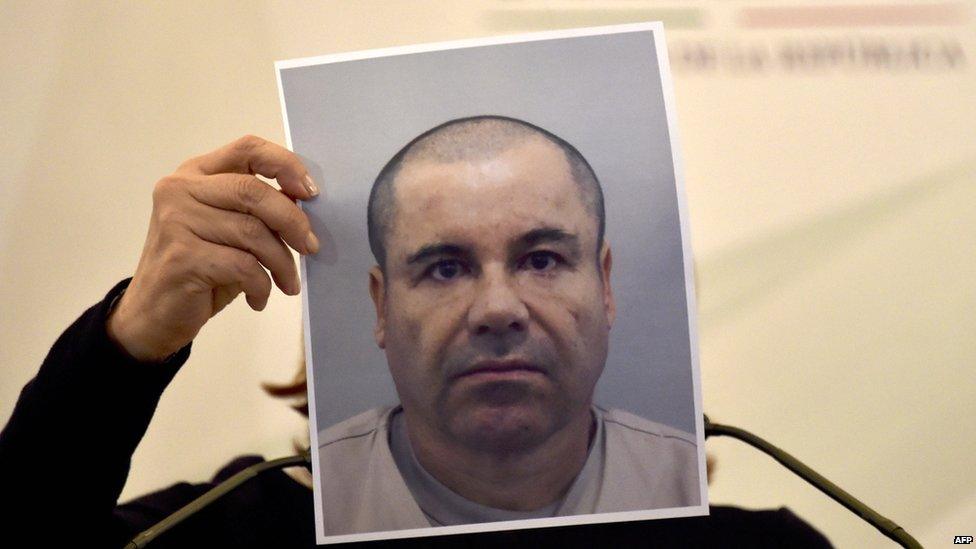
Drug kingpin Joaquin "El Chapo" Guzman's dramatic 2015 prison escape once again highlighted the weakness of state institutions
2018 October - The US, Canada and Mexico reach a new trade deal - the United States-Mexico-Canada Agreement (USMCA) - to replace the North American Free Trade Agreement (Nafta).
2018 - Left-wing former mayor of Mexico City, Andres Manuel López Obrador, is inaugurated president after winning an overwhelming victory in the July presidential election.